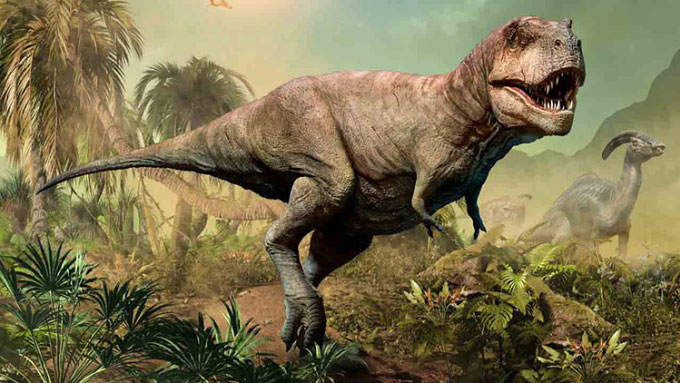Why did tyrannosaurs have two very small forelimbs?
New research suggests that the T-rex's short arms were an evolutionary way to reduce their risk of injury when hunting.
The T-rex is perhaps the best-known dinosaur, but over the years, scientists have been unable to give a definite answer to an important question about the creature's anatomy: why two wings its arms or forelimbs so short?
An adult T. rex 13.7 m long can have a skull up to 1.5 m long, but arms are only 90 cm long. That's like a 1.8m tall person with arms only 12.7cm long.

Simulate the tyrannosaur T-rex.
The ancestors of the T-rex are thought to have had a smaller body size, but with larger forelimbs. That suggests there must be a reason for the later reduction in arm size. Previous studies have suspected short arms helped tyrannosaurs better hold prey and mate more easily, but in a new paper in the journal Acta Palaeontologia Polonica last week, paleontologists from the Institute The University of California–Berkeley (UC Berkeley) in the US offers a completely different hypothesis.
The team believes that T. rex's forelimbs contract in length to reduce the risk of being amputated - either accidentally or intentionally - by its own kind during attack and tearing of prey.
"What if many adult tyrannosaurs competed for a corpse? You would have a bunch of giant skulls, with extremely powerful teeth that easily rip flesh and crush bones. If T -rex feels like it's getting too close for food, it might bite the opponent's hand as a warning.So reducing forelimb size is a boon in this case, anyway T- rex also don't use them for hunting," explained Professor Kevin Padian from UC Berkeley, lead author of the study.
The bite of a tyrannosaur can completely amputate a fellow's arm, leading to infection, bleeding, shock and ultimately death.
In the next phase of research, Padian and his colleagues want to analyze more tyrannosaur fossils to look for bites caused by their own kind.
"Evidence of bite marks on skulls and other parts of bone is well known in tyrannosaurs and other carnivorous dinosaurs. If T-rex had fewer bites on the forelimbs compared with its ancestors of it, that could be an indication that the size reduction has worked," added Padiana.
- Findings show: Earth has 2 new species of tyrannosaurs
- T. rex dinosaurs are real assassins
- Small size snacks that help fight fat
- 'Small' dinosaurs 'small' prey
- The reason small planes cannot take off when it's too hot
- Small details on utensils but have great effect
- The small planet has an Earth-like crust
- Development of chemical computers to store photos with small molecules
- Another 139 small planets were discovered in the Solar System
- Students invent a small shelf, earning $ 2 million a year
- Prepare to launch ultra-small satellite
- Use of small holes in ballpoint caps
 Why do potatoes have eyes?
Why do potatoes have eyes? 'Tragedy' the world's largest carnivorous life: Death becomes ... public toilet
'Tragedy' the world's largest carnivorous life: Death becomes ... public toilet Tomatoes were once considered 'poisonous' for 200 years
Tomatoes were once considered 'poisonous' for 200 years Detecting microscopic parasites on human face
Detecting microscopic parasites on human face